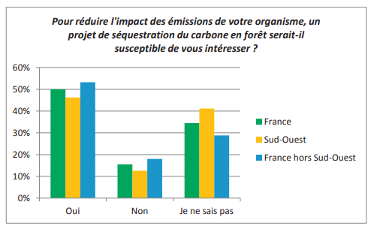What's Bilan Carbone® ?
The Bilan Carbone® is the most widely used approach for accounting and reducing GHG emissions in France. It includes a method and tools enabling any organisation to account for all its GHG emissions and thus become aware of its main emissions and energy vulnerability. As a result, the organisation is able to define its emissions reduction objectives and an associated action plan. The Bilan Carbone ® allows an organisation to know the impact of its activities on the environment in terms of GHG. It allows the organisation to target the major GHG emitting positions of the organisation. It is only after identification and analysis of these factors that the organization can think of solutions to reduce its environmental impact.( source : www.associationbilancarbone.fr/)
In order to assess the vulnerability of activities to the scarcity of fossil fuels, the Bilan Carbone® is a global approach that places all activities on an equal footing :
• the so-called "direct" emissions (scope 1 in the sense of ISO 14069)
• the so-called "indirect" emissions (scope 2 & 3 in the sense of ISO 14069)
Thus, all the flows necessary for the operation of the activity in question are taken into account.
It is thanks to this global approach that the Bilan Carbone® provides a strategic understanding of its GHG emissions. In fact, after carrying out its Bilan Carbone®, the structure becomes aware of two major elements:
• which of its business activities generate the most GHG emissions ;
• how dependent on fossil fuels is it?
In France, greenhouse gas emissions (or carbon balance sheets) are mandatory for private law legal entities (companies) with more than 500 employees in metropolitan France (and more than 250 employees in overseas France), for public law entities with more than 250 employees and for local authorities (regions, departments, municipalities) or EPCIs (metropolises, urban communities, communities of conurbations, communities of municipalities, etc.) with more than 50,000 inhabitants.
France Nouvelles Energies' action is in line with the rules of good practice set on November 5, 2019 by the French Environment and Energy Management Agency (ADEME)
What's the low carbon label?
The Low Carbon Label is a framework for encouraging projects that reduce greenhouse gas emissions compared to a baseline emissions situation. It was established by the Ministry of Ecological and Solidarity Transition in 2018. The projects covered must be additional, i.e. go beyond regulations and standard practice.
To benefit from the Low Carbon Label, projects must refer to a method previously approved by the Ministry of Ecological and Solidarity Transition.
The emission reductions allowed by projects benefiting from the low carbon label and corresponding to an improvement in the current and trend situation defined by the reference scenario are then recognized following verification by an independent third party and their financing.
Once recognised, these emission reductions are recorded on the dedicated register: for each emission reduction it is thus possible to know the project leader or agent as well as the financer(s) of the project. These emission reductions are neither transferable nor tradable, which eliminates any risk of double-counting of reductions.
Three methods for voluntary projects in the forest have been approved under the Low Carbon Label. These methods indicate the steps to be followed for the implementation of projects aimed at developing the different levers for mitigating climate change in the forest-wood sector (source : www.ecologique-solidaire.gouv.fr/label-bas-carbone/).
"From the buyer's point of view, there is a real compensation of his emissions because the reductions are additional and would not have taken place without their purchase." (DGEC, Forêt-entreprise- n° 245- March-April 2019)
• Low Carbon Label - Rewarding actors in the fight against climate change (PDF - 1.04 MB)Are companies willing to contribute to reduce their carbon footprint?
A study by the National Forest Property Centre (Centre National de la Propriété Forestière, CNPF) showed that already in 2017 a majority of the surveyed companies were interested in forest carbon sequestration projects.


